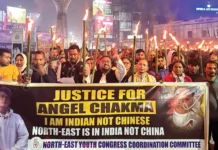[ Varte Lapung ]
Amid debates and discourse regarding religion or related topics like conversion and communalism all over India, a question that arises is, should the state interfere in the religious life of its citizens? The topic of religion and state interfering in people’s religious life highly differs based on the context. Sometimes, the state needs to interfere to address inequalities propagated by religious institutions, and in some cases, the state itself has perpetuated violence against minority religious groups. Amid this chaos, Arunachal’s present government has proposed to implement the Arunachal Pradesh Freedom of Religion Act (APFRA), 1978. This has thrown up debates, paired with the Christians in Arunachal organising a hunger strike. The question here is, is it really protecting the indigenous faith? Is it really against Christianity? Is it stereotyping all religious conversion as forced?
Discussions on religious issues are highly sensitive and need continuous debates and careful analysis. The debate around the APFRA has twin planks to it. While some argue that it is necessary to preserve the religious faiths of the indigenous people, others argue that it is targeting other religions. This extreme polarisation on this issue from both these groups can lead to a violent conflict in the future. Here, we need to see both perspectives and understand what both the groups want (Donyi Polo believers and Christian groups).
First of all, one of the debates surrounding this is that it is a BJP-led propaganda that views tribal religion as part of the ‘Hindu dharma’ which needs protection from conversion. In recent times, we did see the ‘Hinduisation’ of the Donyi Polo religion, where idol worship, the use of incense sticks, and chanting prayers have been adopted. In a world where the dominant cultures and religious groups are assimilating minority populations into their group, where can we locate the future of it?
Secondly, many critics argue that conversions are not forced. Yes, some are willingly converting. However, to say that all conversions are not forced is highly debatable, as forced conversion does not always require physical violence, gifts, or fraud. Conversion can be a slow process where the dominant group slowly, through the process of manipulation, tries to convert people to their religion. If you take a stroll one fine day, you will find young people standing on the streets who would ask you to listen to them,saying verses from the Bible in the capital region. The question is, do we need youths engaging in such religious activities, or do we need youths who privately follow their religion in their personal space and focus more on the academic and educational areas? The Christian population, saying that “religion is a private and individual choice” tends to forget that the conversion process has not become so private anymore.
The third argument I would like to put here is how the religion of Donyi Polo has been criticised from a very Eurocentric mindset. The Tani clans following the Donyi Polo religion have often been criticised for rituals, including sacrifices and drinking alcohol. This view is very Eurocentric, in the sense that tribes are seen as ‘primitive’, and sacrifices that they practice are seen as ‘bad’. However, who decides what is bad and what is good? If the so-called tribes went around the world and colonised every country, sacrifice now would have been the standard of every community. Yes, there are debates around sacrifices relating to animal rights; however, in this context, the group accusing the tribal population of performing sacrifices tends to forget that they consume meat for their meals. Therefore, seeing sacrifices as bad work is nowhere close to the idea of animal rights but is purely a Eurocentric mindset of viewing own tribal groups as primitive.
Additionally, why is the implementation of the law a tragedy felt only by the Christian people? There may be conversion to Islam and Hinduism, too. This can be because Hindus consider tribal religion as part of Hindu dharma’, as mentioned before. However, it is important to note that tribal groups are not passive and equally need to resist such Hindu practices that they have recently started adopting. When it comes to Islam, it is just in its rudimentary stage. Therefore, the strong opposition from the Christian population is high as the group following the Christian religion is in the majority.
We need to understand that the APFRA as an Act is a reaction to the increasing conversion. However, it would be highly insensitive of the government to implement the APFRA with the law’s Clause 5(2), which includes imprisonment for not informing the deputy commissioner in a given period. Furthermore, the groups arguing for not giving the schedule tribe (ST) status to people converted to different religions need to understand that reservation was never based on religion but on historical exploitation and for better representation. The whole argument around reservation should not be brought up in the first place.
We need to understand that the APFRA, as an Act, is to preserve the indigenous faiths; however, is it going along these lines? While it is important to document and keep records on conversion, imprisonment as one of its punishments is highly oppressive. We also need to understand both perspectives. Policies that support culture, tradition, and education and encourage youths to understand the importance of education over religious matters are critical. It is high time that we realised that policies to preserve the so-called indigenous faith are needed in the contemporary society of Arunachal. However, it is also the government’s job not to include any punishment and imprisonment of any person based on religion and related things.
With all the debate surrounding this issue, we need laws and policies that preserve indigenous religions, keeping in mind that they do not lead to extreme polarisation among communities, and understanding how sensitive the issue of religion is in a country like India. (The contributor is a student of the Tata Institute of Social Sciences, Tuljapur, Maharashtra. The views expressed are personal.)


